Vietnam Pivots To US With Wary Eye On China: Arms Ban Ends
Posted on
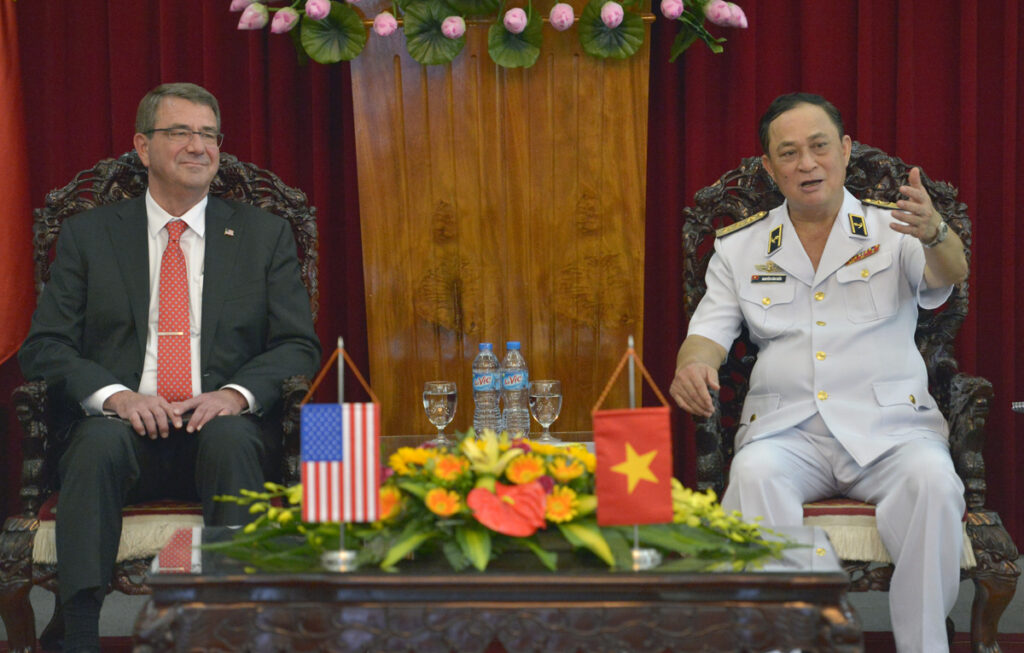
Sec. Carter with Vietnamese Navy commander Adm. Nguyen Van Hien in Haiphong in 2015.
ABOARD SECDEF CARTER’S PLANE: In many ways, today marks the final exorcism of the Vietnam War as America turns to the much greater challenge of a rising, militarizing China — and as Hanoi seeks just enough US help to balance Beijing without provoking it.
President Obama is in Hanoi and Defense Secretary Ash Carter in New Haven. Yesterday, Obama lifted long-standing restrictions on arms sales to Vietnam. This afternoon, Carter will address Yale University’s first ROTC class to graduate since his alma mater expelled the program during the Vietnam War — the year he arrived as an undergraduate.
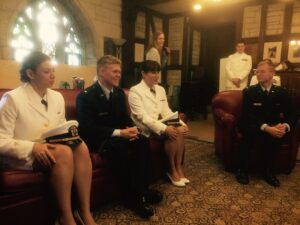
Graduating Yale ROTC cadets, Class of 2016
Carter had already signaled the arms embargo would end, and he praised the administration’s move to the four reporters accompanying him to New England: “Bilaterally, this allows us to make yet further advances in what is really a historic military-to-military relationship with Vietnam.”
He signaled that naval systems would continue to dominate the relationship, which he said is “particularly reflected in the maritime domain, which is one of the areas we work most closely with Vietnam.” The biggest ticket items the US has transferred so far are 18 patrol boats, accompanied by training and “maritime law enforcement equipment” for the Vietnamese coast guard, but the vessels are all unarmed in accordance with the ban on lethal exports. Obama’s action yesterday ends that ban.
Since the US left in 1973, Vietnam has fought with China on land, along its northern border, and at sea, notably in the formerly Vietnamese Paracel Islands that now host Chinese airbases and missile batteries. More recently, China’s Haiyang Shiyou 981 oil rig (HYSY 981) has made repeated incursions since 2014 into Vietnamese-claimed waters in the natural resource-rich South China Sea. While lethal weapons aren’t Vietnam’s most urgent need — that would probably be long-range surveillance systems to spot the Chinese interlopers — it’s still geostrategically significant that the US has opened the door to export them.
Arms aren’t the only area of cooperation. The Army plans to stockpile disaster relief supplies on Vietnamese soil. On Carter’s own visit to Vietnam last year, the secretary said: “I had the privilege to be the first American (Defense Secretary) visitor to Haiphong Harbor (and) the Vietnamese fleet there.” (The harbor was notoriously mined on Nixon’s orders in 1972). There are repeated rumors that Vietnam may invite US ships back to their pre-1973 base at Cam Ranh Bay.
Carter assiduously avoided the word “China,” so, naturally, I brought it up. “Nothing we do there is directed at China,” he emphasized, “but there no question that China’s actions there, particularly those over the last year, have heightened concern in the region, and that’s another factor that causes them to work with us.”
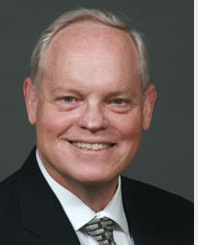
Andrew Krepinevich
Experts dismissed Carter’s demurral. “The lifting of the arms embargo on Vietnam may not be publicly stated as directed against China,” said Andrew Krepinevich, president emeritus of the Center for Strategic & Budgetary Assessments, “[but] diplomatic niceties aside, it is a clear and welcome sign that the United States is becoming serious about maintaining peace and stability in the region in the face of China’s increasingly belligerent behavior.”
“Through its overtures to the Philippines and now Vietnam, the United States has the potential to transform China’s militarization of South China Sea islands into a military cul-de-sac, flanked by the Philippines to the east and Vietnam to the west,” said Krepinevich. “Secretary Carter deserves a great deal of credit for these encouraging initiatives to demonstrate U.S. resolve in the defense of peace, stability and respect for the rules-based international order.”
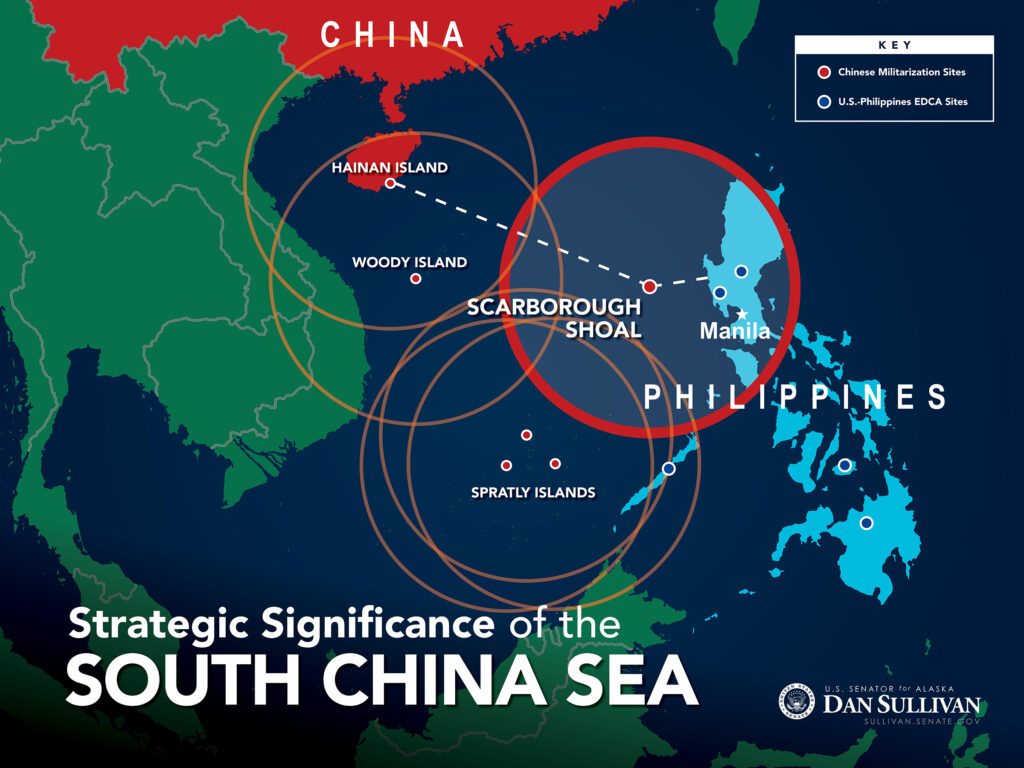
Graphic courtesy Sen. Dan Sullivan
“It isn’t surprising that the US is downplaying the ‘anti-China’ component of President Obama’s visit, the lifting of the arms embargo, and the expanding US-Vietnam relationship more generally,” said CSIS scholar Bonnie Glaser. “No Southeast Asian nation wants to join an overt anti-China coalition that would provoke Beijing and lead to increased Chinese pressure. Rather, Vietnam, like other neighbors of China, seeks closer ties with the US and other external powers to counterbalance China” — quietly.

Gregory Poling
“From Hanoi’s perspective, this is of enormous symbolic value for Vietnam’s leadership,” added fellow CSIS scholar Greg Poling. “It says that relations with the U.S. are now fully normalized, and it takes away an important argument that some in the leadership have used to argue against closer relations with the US: that the arms embargo is evidence Washington doesn’t fully respect Communist party leadership and still seeks regime change.”
“t won’t immediately result in big US arms sales to Vietnam,” Poling continued, “but by giving such an important win to those in Hanoi arguing for diversifying relations to balance China, it will have a big windfall in trust gained and will open doors to cooperation on other fronts.”

Bonnie Glaser
So what does Beijing think? For their part, Glaser said, “the Chinese view the lifting of the arms embargo as an effort by the US to strengthen its rebalance to Asia and to contain China, especially in the South China Sea. They remain confident, however, that Hanoi will not lean too far towards the United States and put ties with China at risk. They know that Vietnam shares a border with China and needs to retain good relations with China.”
From China’s perspective, she said, “lifting the restrictions on weapons sales is partly symbolic; exercising with the US Navy or allowing US ships to frequently visit Cam Ranh Bay would be far more worrisome. The Chinese are also more concerned about the TPP (Trans-Pacific Partnership), which will have a negative impact on the China-Vietnam economic relationship and further strengthen US-Vietnamese ties.”
It’s not just bilateral ties with Vietnam that are growing stronger, Carter emphasized on the eve of his trip to the 28-nation Shangri-la summit in Singapore next week (which he’ll be missing his Yale reunion for). “More and more countries in the region are coming to the United States more and more to do more and more with us,” the secretary said, “because of their general concern with the security environment in the region.”
Those countries recognize that “the Asian miracle of the last 70 years has been the result of peace and stability in the region,” Carter said. “The American presence there and our pivotal role — which we intend to continue — has made that possible.”
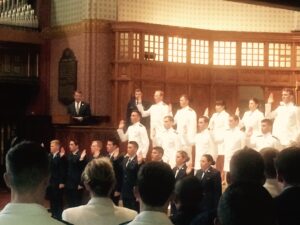
Sec. Carter swears in Yale ROTC’s class of 2016,
That positive view of the US military in Asia would have been a hard sell when Carter was an undergraduate at Yale. Not so today, when the disastrous 30-year Franco-American war in Vietnam looks like an anomaly in the larger historical context. The anti-military sentiment of the 1970s has “very much dissipated,” Carter said. “Partly that’s a generational thing.”
“I’m so gratified now it’s just the opposite,” Carter continued. “I think the society’s very admiring of the…Department of Defense and the military.”
[UPDATED from Yale ceremony:] “Our country’s 100 percent behind you,” Carter told the graduating cadets. “Our country’s very proud of you. I’m very proud of you.”
Subscribe to our newsletter
Promotions, new products and sales. Directly to your inbox.
